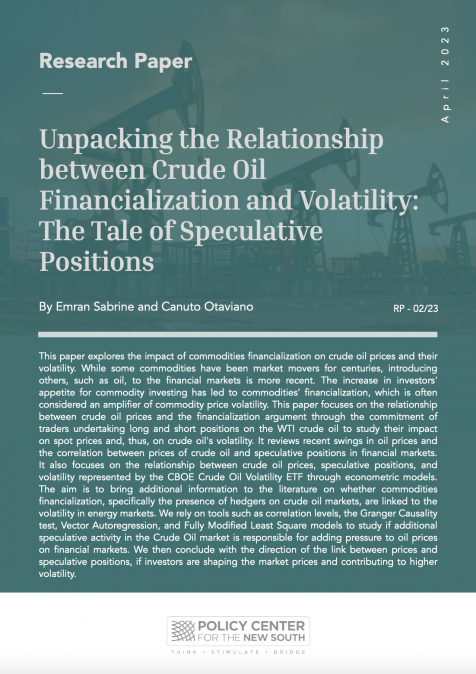In this interview, with Mr.Carlos Alexandre Monteiro Reis, Head of the Rabat Programme Office, UNOCT, Morocco, we discuss the current efforts being undertaken to counteract the radicalization of extremist movements, as well as the need for enhanced cooperation to support impoverished and less educated regions. We explore the connection between extremism and socioeconomic conditions, examining how collaboration can effectively address and mitigate these phenomena.
RELATED CONTENT
-
AuthorsMay 8, 2023The energy sector faces many challenges that undermine economic growth, energy security and access, and environmental sustainability. To address these challenges, Atlantic Basin countries need to improve access to reliable energy, diversify their energy mix with low-carbon alternatives and improve energy efficiency in the long term. However, the transition to clean energy will also create new risks and challenges that differ from one Atlantic country to another, requiring additional ...
-
May 8, 2023In March 2023, the brutal demise of the Silicon Valley Bank (SVB) was the first to happen as a result of the hiking of interest rates that central banks started implementing from late 2021 onwards. Although the Federal Deposit Insurance Corporation (FDIC), a US government corporation pr...
-
Rim Berahab & Ana Ayuso PozoMay 05, 2023This podcast examines current trends in energy production and consumption in the Atlantic region. It discusses the challenges facing the energy sector due to the outbreak of Covid-19 and ...
-
AuthorsInácio F. AraújoMay 5, 2023This paper presents a synthetic view of the socioeconomic and environmental impacts of the economic sectors and regions that make up the Moroccan economy, taking into account the current economic structure and production technologies. Therefore, the potential effects must be understood as signals to think about interventions aimed at redirecting the desired trajectories of sustainable development. The application of the tools developed to give scientific support to this analysis rev ...
-
 AuthorsMay 4, 2023La première bipolarisation a appartenu au XX° siècle et opposé États-Unis et URSS. Avec la guerre froide, elle était l'expression de la rivalité entre deux systèmes antagonistes. La seconde est née de la montée de la Chine populaire qui est entrée en compétition avec les États-Unis. Une compétition au départ économique et technologique, devenue aussi, au fil du temps, culturelle et stratégique, dans un monde interdépendant et digitalisé, mais également segmenté, complexe et incertai ...
AuthorsMay 4, 2023La première bipolarisation a appartenu au XX° siècle et opposé États-Unis et URSS. Avec la guerre froide, elle était l'expression de la rivalité entre deux systèmes antagonistes. La seconde est née de la montée de la Chine populaire qui est entrée en compétition avec les États-Unis. Une compétition au départ économique et technologique, devenue aussi, au fil du temps, culturelle et stratégique, dans un monde interdépendant et digitalisé, mais également segmenté, complexe et incertai ... -
AuthorsMay 3, 2023For over six decades, Morocco has largely equated the achievement of food self-sufficiency (FSS) in ‘strategic’ food commodities to achieving food security. Successive governments have succeeded in guaranteeing the availability of and access to these commodities for the poor and vulnerable. In so doing, they have maintained social stability by fulfilling a basic social contract with the people. This is a major achievement, but the financial, economic, and environmental costs of this ...
-
May 2, 2023على ضوء الاجتماعات السنوية لمجموعة البنك الدولي وصندوق النقد الدولي في التقرير الأخير لصندوق النقد الدولي حول آفاق الاقتصاد العالمي، والذي يطبعه القلق الزائد في ظل اضطرابات القطاع المالي والتضخم المتزايد والآثار المستمرة للاجتياح الروسي لأوكرانيا، بالإضافة إلى العواقب الاقتصادية الم...
-
Imane Lahrich & Mohammed LoulichkiMay 02, 2023بمناسبة اليوم الدولي للتعددية والدبلوماسية من أجل السلام، قررنا تخصيص الحلقة إلى إفريقيا ومبدأ تعددية الاطراف في سياق اوضاع السلم والأمن الهشة في منطقة الساحل وانتشار عدم الاستقرار في الب ...
-
Youssef El Jai & Mark AspinwallApril 28, 2023In this podcast, we explore the issue of sustainability in the Global South as it pertains to the energy transition and the challenges faced in implementing policies. Drawing on Professor ...
-
AuthorsApril 28, 2023This paper explores the impact of commodities financialization on crude oil prices and their volatility. While some commodities have been market movers for centuries, introducing others, such as oil, to the financial markets is more recent. The increase in investors' appetite for commodity investing has led to commodities’ financialization, which is often considered an amplifier of commodity price volatility. This paper focuses on the relationship between crude oil prices and the fi ...







